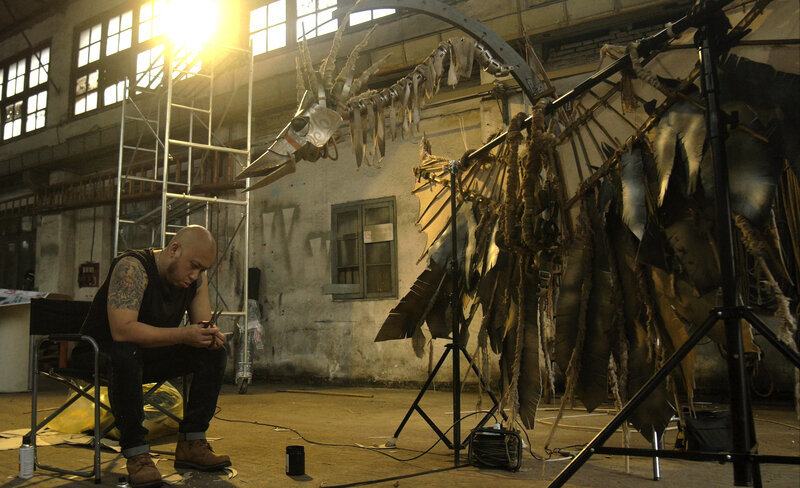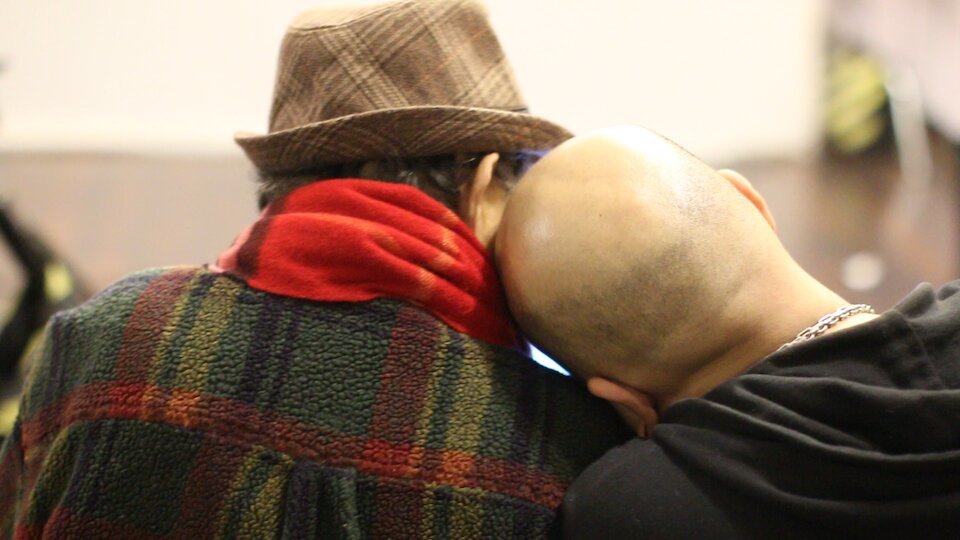An Ode to Childhood, Memory, and Fatherhood
Review of Our Time Machine at NW Film Forum
Written by TeenTix Newsroom writer Yoon Lee and edited by Teen Editor Mila Borowski

The first scenes when watching Our Time Machine are of shadow puppets, held up to a light against a translucent screen. The warm, gentle light filtering through the yellowing paper; the lifelike, flowing movements of the son puppet pedalling on a bicycle as his aging father chases after him; the soft glow highlighting the son in bed; the tinkling of toys and bikes; this whole opening oozes of nostalgia, the memories of being a child. Much like Papa’s Time Machine, the play this scene is taken from, this movie is an ode to a child’s memories of his father.
Directed by Yang Sun, S. Leo Chiang, and Shuang Liang, (and produced by Yang Sun and S. Leo Chiang), Our Time Machine follows an artistic photographer, Ma Liang (Maleonn) on a journey to create, fund, and ultimately perform his play Papa’s Time Machine, a tribute to his father who is ailing from Alzheimer’s disease. Our Time Machine is a phenomenal movie. Most documentaries are built on going from one idea or fact to the next. In the context of the genre this is not a bad thing, documentaries are meant to convey information in an understandable manner to an audience. However, Our Time Machine is unique in how it is built like a true movie. It has unique pacing and plot points that keep you interested in the story of Maleonn as he struggles to create and fund his project as a tribute to his father. The sampling of interviews and behind-the-scenes footage are deliberate and well-used. Not a single scene is unnecessary. For example, there is a scene in the latter half of the movie where Maleonn's parents are moving to a retirement home. This is payoff to an earlier scene with Maleonn wishing to buy a house for them, but his mother expressing how she is being overwhelmed by his father’s deteriorating state. There is a scene where the mother and father are in a car, and the mother is declaring their moving to the home. Although short and without explicit dialogue, one can feel the emotion behind the scene. In addition, there are many scenes without explicit emotional reconciliation, and are upsetting emotionally; these examples demonstrate how reality is unkind, and oftentimes unforgiving.

The film is interspersed between true, documentary-style scenes, and ones seemingly specially designed for this film, like a “true” movie. This alternating of traditional documentary-style filmmaking, and more artistic, feature film scenes, adds impact and artistry to the movie. For example, there is the recurring scene of Maleonn's puppets illuminated against a translucent screen, coming back every so often to drive home the connection between father and son. There is another recurring scene, with the father puppet being manipulated over a pool to appear as if it is swimming, connecting to an anecdote by Maleonn. In the film, he recounts being in a pool with his father, and his father asks if Maleonn knew how to float, then making a round around the pool to demonstrate. Once he comes back around, his father asks again if he knows how to float, so Maleonn makes another round. This continues five times. Maleonn attributes this story as the first sign of his father’s memory loss. These scenes, short as they may be, add artistry to the film.
Of course, there are heavy themes it delves into. It manages to portray such weighty topics as memory and Alzheimer’s in an accessible, emotional way. Despite being almost whimsical, with the steampunk-like puppets and eccentric props, it is a respectful and touching way to address the devastating impact of the disease. The portrayal of Maleonn’s father, Ma Ke, through the interviews and circumstances that he is in, is both heartbreaking and happy. Ma Ke used to be the director of a Peking Opera theater in Beijing, up to the advent of the Cultural Revolution. It’s heartbreaking to see this once-great man, a man who used to memorize the lines of all of his actors for them, frustrated at how his mind has become clouded. His “machine broke”. What makes this all the more gut-wrenching for me is that my grandfather said the exact same thing, a few years ago.

My grandfather is a former engineer. He graduated from Seoul National University, the prestigious engineering school in South Korea. He lives in Korea and I have lived in the US for most of my life, meaning that I cannot visit him often. But one of the times I did, he had already been diagnosed with Alzheimer’s disease. Engineers are precise, have clear and quick memories because they need to. Yet all the same, his “machine broke”.
Ma Ke and my grandfather are different. Ma Ke is Chinese, my grandfather is Korean. Ma Ke was the director of a prestigious Peking opera theater, my grandfather was an engineer. Yet, despite living completely different lives, faced with the same horrible disease they said the same thing: “the machine broke”.
Despite this, there is optimism and hope, found in the nostalgia of childhood; Maleonn represents this idea with his play. The son wants to connect with his ailing engineer father by creating a time machine. In a way, Maleonn creates his own time machine, with the creation of this play. Maleonn uses art because it is his way of making more memories of him and his father, by recreating his father’s own memory. Yet the beauty of this play is that even if Maleonn and his father forget the art they have created in the past, it has conveyed their own memories to the world.
Our Time Machine is about the relationship between father and son, the past they have in their memory, and finally, the future generations their memories build. Despite the depressing subject matter, Maleonn leaves off on a happy note. His daughter is born, and has her 100th day anniversary. Maleonn revels in his father’s recurring discovery, and subsequent joy, that he has a granddaughter. Even with the death of someone’s memory, another life is born, and the cycle of life and memory continues. When I video call my grandparents and see his face light up, I suppose I am that next part of a cycle as well.
Our Time Machine is streaming online via NW Film Forum through October 18, 2020. For more information see here.
Lead photo credit: Maleonn Studio
The TeenTix Newsroom is a group of teen writers led by the Teen Editorial Staff. For each review, Newsroom writers work individually with a teen editor to polish their writing for publication. The Teen Editorial Staff is made up of 6 teens who curate the review portion of the TeenTix blog. More information about the Teen Editorial Staff can be found HERE.
The TeenTix Press Corps promotes critical thinking, communication, and information literacy through criticism and journalism practice for teens. For more information about the Press Corps program see HERE.

